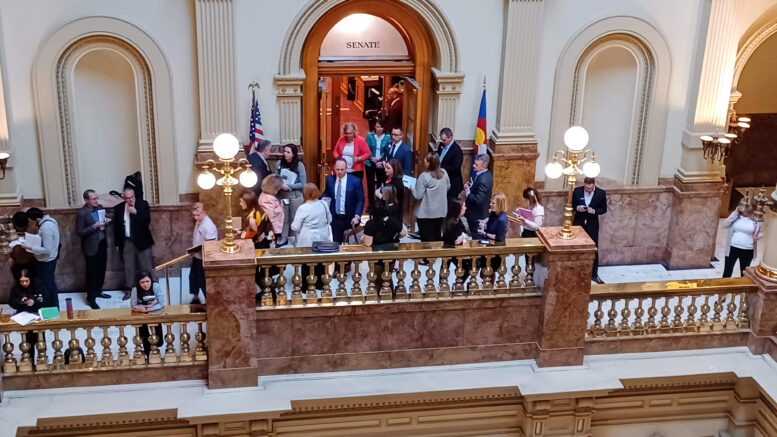Over the next three to seven days, the Colorado General Assembly will take steps to roll back tax credits, cut spending and dip into its reserve fund. But leaders are clear: Even when the special session adjourns, this is just the beginning of this process, not the end.
For while the Legislature finds itself in a $783 million budget shortfall that has necessitated its mid-summer return to the Capitol to re-balance its fiscal plan, the passage of a few bills now won’t solve what is expected to be a precarious revenue shortage again next year. And as such, the 65 representatives and 35 senators are engaging in a full rethinking of what the state needs to pay for — including which long-standing tax credits need to stay and which need to go — and what exactly are the core services that Colorado should offer.
Only six business-focused tax breaks are on the table for this special session, as Gov. Jared Polis issued a narrow call regarding which tax expenditures can be reconsidered, and legislators have stuck to those topics in their pre-filed bills. But while insurers, small retailers and limited liability companies express concern about the lack of certainty regarding the regulations their sectors operate under, a larger swath of tax expenditures will come under the microscope in 2026, legislators say.
“We want to be thoughtful about this. Closing corporate loopholes is very important — as is doing it in ways that we don’t hurt small businesses or raise costs for families,” Rep. Shannon Bird, a Westminster Democrat and vice chair of the Joint Budget Committee, said. “This is a first pass, and we’ve got more work to come.”

Colorado state Rep. Shannon Bird speaks during an online news conference featuring Democratic legislative leaders on Tuesday.
Spending cuts versus tax-break cuts
It’s likely that the six tax breaks that majority Democrats are looking to rein in all will pass in some form, though Republicans and business groups will try to limit some of the revenue losses that businesses are set to incur because of them. However, the tenor of debate after the General Assembly gavels in at 10 a.m. today — not just over its spending but over health-insurance subsidies and artificial-intelligence regulation too— could give indication of what stepped up debates in January will be like.
Minority Republicans have ramped up their attacks this month that the budget shortfall is the result not of the tax reductions made by the federal “One Big Beautiful Bill” so much as it is years of overspending by legislative Democrats. And they will push for fewer tax-deduction rollbacks and more cuts from the budget.
JBC Chairman Sen. Jeff Bridges, D-Greenwood Village, said he hopes to balance the budget by eliminating $300 million to $400 million in tax breaks, cutting around $300 million in spending and taking $200 million to $300 million from the state’s reserve fund.

Colorado state Sen. Jeff Bridges speaks during an online news conference featuring Democratic legislative leaders on Tuesday.
How spending cuts will occur
For as big a part of the solution as budget cuts will be, legislators will spend relatively little time over the next week discussing the specifics of what those cuts will be. Instead, Democrats will put forth a bill requiring that the governor brief the JBC more thoroughly on the cuts he plans to make when the budget falls out of balance outside of the parameters of the regular session, which will permit more legislative feedback.
Bridges said the complexity of discussions that need to occur around $300 million in cuts are too much to have during a short special session with other issues on the floor. But he said that Polis’ staff is already working on the issue, and he estimates that cuts could begin by Sept. 1. The kind of turnaround that would avoid the state spending even more money as the fiscal year goes on and then having to make deeper cuts if legislators would have to wait to approve them as a body in January, halfway through the fiscal year.
Thus, most of the discussion in the coming days will come over the proposed tax-credit rollbacks. And several of those debates are expected to be spirited.
Tax breaks on table in special session
Insurers have warned, for instance, that a proposal to eliminate a 1% premium tax credit given to any company with at least 2.5% of its national workforce in Colorado will lead to loss of jobs and to higher premiums. Backers of the bill point to a state audit showing that the regional- and home-office tax credit has failed to keep the beneficiaries from reducing jobs already, however, and that debate likely will result in a clash of hardened opinions.

Colorado state Rep. Emily Sirota speaks during an online news conference featuring Democratic legislative leaders on Tuesday.
Another bill would eliminate the 4% vendor that smaller retailers can keep for calculating and submitting taxes that they owe the state. Republicans have proposed a constitutional amendment that would require voter approval if any change were to be made to the vendor fee. But Rep. Emily Sirota, D-Denver, has said that figuring and submitting the taxes “is now essentially an automated process that everyone has access to,” negating the need for incentives for retailers to do the work.
Democrats also are seeking to extend the decoupling of state tax policy from a federal 20% tax break given to closely held companies like LLCs and sole proprietorships, saying Colorado law stops only the largest employers from taking the break. The state can save about $46 million annually with the extension, Bridges estimated.
Republicans, however, will introduce a bill that classifies extension of the decoupling as a change in tax policy that would require voter approval under the Taxpayer’s Bill of Rights — a way to try to stop Democrats from pushing their effort. That same bill also seeks to repeal a decoupling of state tax policy from federal policy on overtime wages, which would have the effect of exempting overtime pay from taxation under Colorado law and could allow workers to keep some $400 million to $600 million annually in overtime earnings.
Special session about “tax loopholes” or raising taxes?
In debating these and other tax-policy changes over the next week — and, likely, into next year — Democrats will argue that the federal tax bill overwhelmingly benefitted large businesses at the expense of individuals and will cost state programs needed funding.
“That budget (bill) has blown a hole in the state budget,” House Speaker Julie McCluskie, D-Dillon, said during a news conference on Tuesday. “The way we’re going to (address) that is by closing tax loopholes that are only benefitting big businesses and corporations.”

Colorado House Minority Leader Rose Pugliese speaks with her caucus at a Thursday news conference in the Capitol.
Republican efforts are unlikely to be successful, given the steep margins by which Democrats control both legislative chambers. But in a Thursday morning news conference, they emphasized that, much like Democratic efforts to reconsider existing tax breaks, they see this as the beginning of a running debate over what businesses should keep and what the state needs from them in taxes.
“The (special-session) call is not asking us to as Republicans to come forward and sit at the table and discuss spending,” House Minority Leader Rose Pugliese, R-Colorado Springs, said. “Instead, this is ‘Let’s raise taxes on the good, hard-working Coloradans and continue spending.’”
